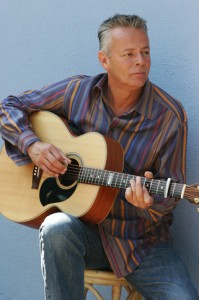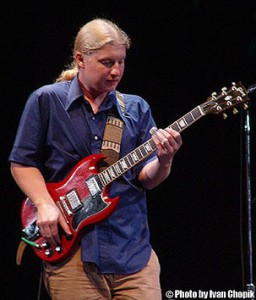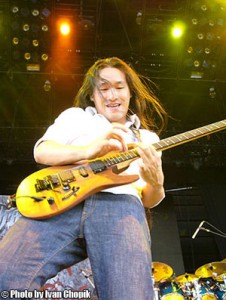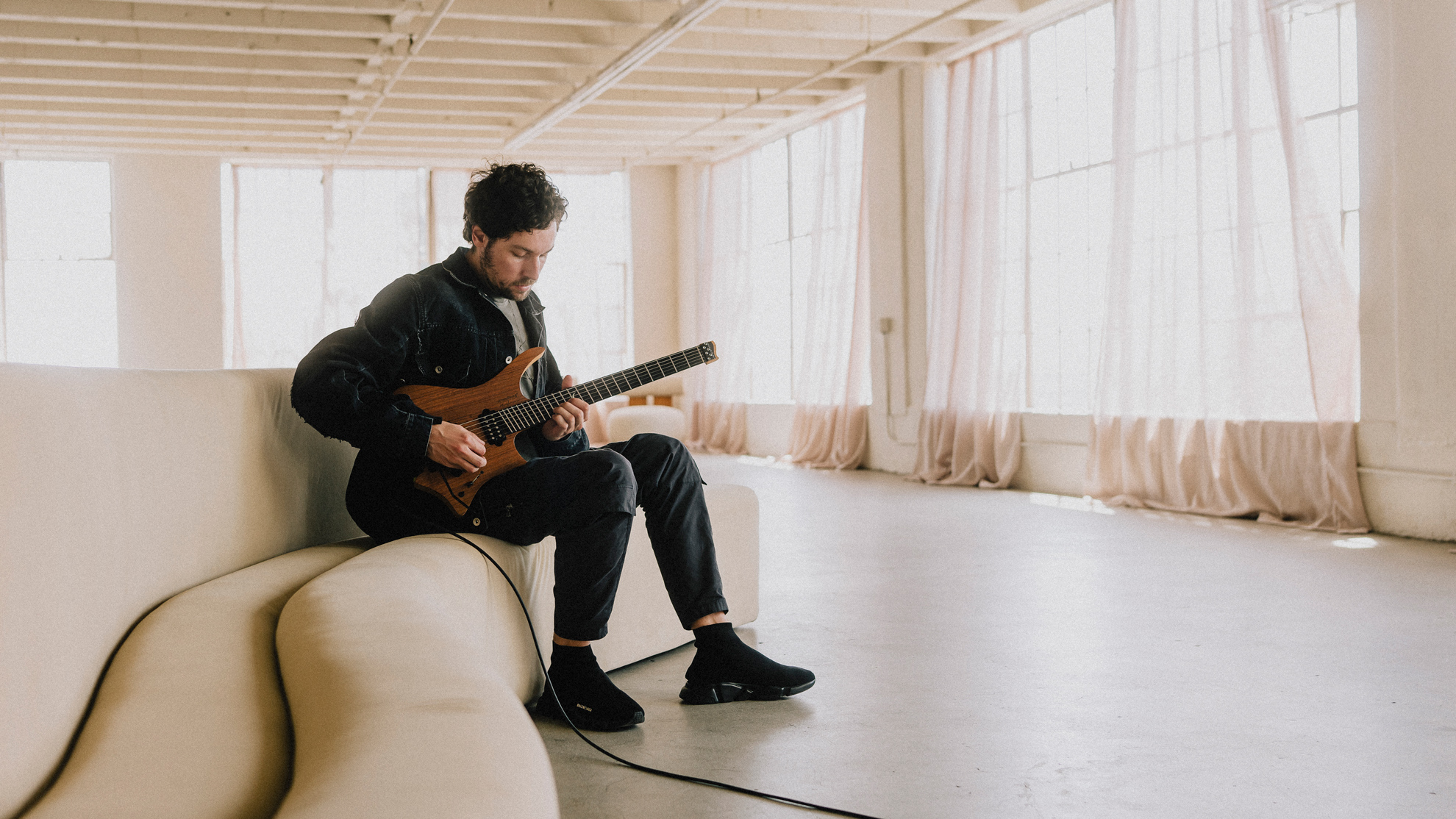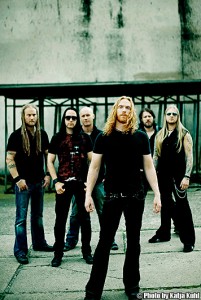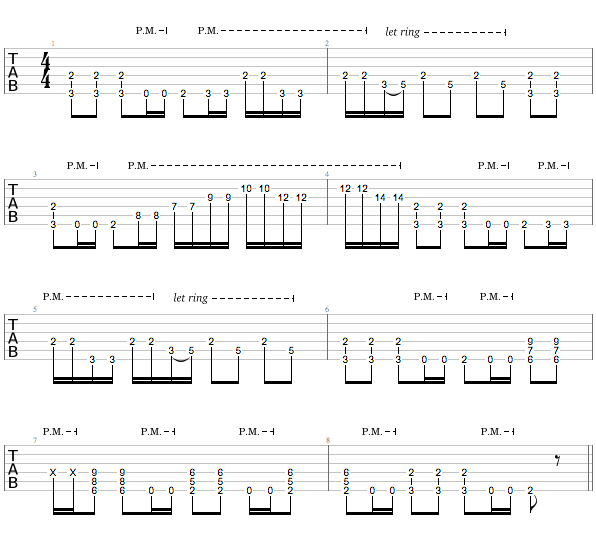 This interview features a true guitar master. However, Alexander ‘Sasha’ Ostrovsky’s talent is not limited to just the one type of guitar – he plays the dobro, as well as classical, electric, steel, and lap steel guitar. Sasha was a member of the Grammy-nominated Russian country band Bering Strait, which disbanded in 2006. Since then the members of Bering Strait have moved on to their own solo careers. Sasha has moved on as well and is currently an in-demand session player in Nashville. In addition, he is currently recording with his new band – Buckledown. Be sure to check them out at www.myspace.com/buckledownmusic.
This interview features a true guitar master. However, Alexander ‘Sasha’ Ostrovsky’s talent is not limited to just the one type of guitar – he plays the dobro, as well as classical, electric, steel, and lap steel guitar. Sasha was a member of the Grammy-nominated Russian country band Bering Strait, which disbanded in 2006. Since then the members of Bering Strait have moved on to their own solo careers. Sasha has moved on as well and is currently an in-demand session player in Nashville. In addition, he is currently recording with his new band – Buckledown. Be sure to check them out at www.myspace.com/buckledownmusic.
IC: What are you doing nowadays since Bering Strait disbanded last year?
SO: Well, I have a few things going on right now. First, I have a rock band that me and a couple of friends of mine started sometime last year and it has a very unique sound. The band is called Buckledown. It’s totally rock, nothing to do with country, but the instrumentation is very unique. I play lap steel, and we have a drummer, a bass player, and lead singer, who plays electric guitar. But the second solo instrument is violin.
Andy Z is the violin player in the band… his day-gig right now is actually playing with symphonies and conducting and doing that stuff. So he’s a classically trained guy, who is a rocker at his heart. I’m also classically and jazz trained and I’ve been playing country music for a long time but I’m a rocker in my heart too. I’ve loved rock music ever since I was a kid.
So right now this is the project that I’m really really interested in. We’re in the studio recording a few songs… and then we’ll start going to the labels, management companies, and booking agents. So this is what I’m up to these days as well as some session work in Nashville, playing on some people’s records and touring a lot as well. I played last year with Sugarland, Ashley Monroe (who is a new artist on Sony Records), Trent Tomlinson (another new artist on Lyric Street Records), and Billy Gillman was also one of the artists I worked with last year. Whenever I have time apart from working with other people I concentrate on Buckledown… hopefully try to get places and I have faith we will.
IC: How did you get started with playing music and what’s your educational background in this area?
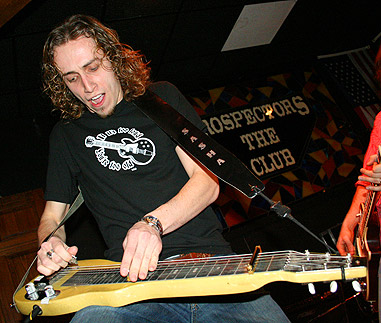 SO: I grew up in a city 60 miles south of Moscow called Obninsk. My dad took me to a music school for kids when I was 7 and I started playing and learning classical guitar and I’ve been playing it for a long time since then. After graduating from the music school for kids and then from high school, I went to a famous jazz music college in Moscow called Gnesin Music College, where I studied jazz, as well as classical guitar.
SO: I grew up in a city 60 miles south of Moscow called Obninsk. My dad took me to a music school for kids when I was 7 and I started playing and learning classical guitar and I’ve been playing it for a long time since then. After graduating from the music school for kids and then from high school, I went to a famous jazz music college in Moscow called Gnesin Music College, where I studied jazz, as well as classical guitar.
By that time I had already been playing dobro, lap steel, and steel guitars so I kind of introduced all the professors there to these instruments that almost nobody in Russia has ever heard of. They were pretty fascinated and I actually somehow managed to do my final exam on all of them. The professors and the faculty there were very nice about letting me play my instruments as opposed to just making me do everything on classical and electric guitar.
So that’s my formal music education. I’ve also been with Bering Strait since 1994. I’d say this is the most of my education – just playing with and listening to everybody’s records, jamming with people at the bluegrass festivals and just good musicians – friends of mine.
IC: Who would you say are your main influences?
SO: There are actually a lot of them. As far as my instruments, Jerry Douglas is definitely my main influence on dobro and lap steel. As far steel guitar it’s definitely Paul Franklin. He played with Dire Straits and toured with them. That’s how I learned to play steel – from listening to Mark Knopfler and Dire Straits and playing Paul Franklin’s parts. That’s as far as instruments go, but as far as music in general there’s so many influences. It started with Beatles, Led Zeppelin, Deep Purple, then going into all these great instrumentalists from Bluegrass (like Jerry Douglas and Béla Fleck) to Americana and Jazz. I could have named an enormous amount of musicians that influenced me as a musician and as the instrumentalist of my style.
IC: Let’s talk a bit about Bering Strait. What led to the break-up of the band?
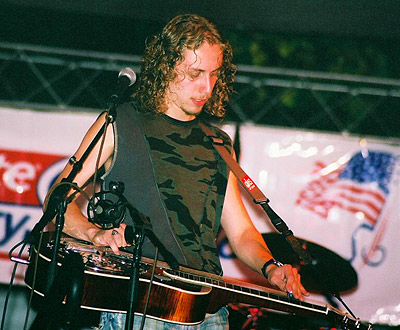 SO: We’ve been together for almost 18 years from the very first time the guys came together. I was with the band for 13 or 14 years. We knew each other since we were kids. We did pretty much everything together. We lived together for a very long time and were on the road, did everything. I think the reason was that we were too unique for the national industry for country music. I mean we were playing country, but a lot of people thought we were playing bluegrass, because that’s how [prestigious American news program] ‘60 Minutes’ portrayed us. We came from bluegrass, that’s where we started, but we had so many influences and there were a lot of really really awesome players in the band.
SO: We’ve been together for almost 18 years from the very first time the guys came together. I was with the band for 13 or 14 years. We knew each other since we were kids. We did pretty much everything together. We lived together for a very long time and were on the road, did everything. I think the reason was that we were too unique for the national industry for country music. I mean we were playing country, but a lot of people thought we were playing bluegrass, because that’s how [prestigious American news program] ‘60 Minutes’ portrayed us. We came from bluegrass, that’s where we started, but we had so many influences and there were a lot of really really awesome players in the band.
Ilya Toshinsky is the guitar player. He is right now one of the top session players in the Nashville. He produces a lot of rock bands and country artists and he plays on a lot of records in Nashville and LA. It was almost was too much talent in one band (laughs). Both of our girls are extremely talented singers and songwriters. It was very hard to exhibit everything that we wanted to do through one project. To many people in the country industry we were just a novelty, which is not a problem for people who go see the shows. There were so many cases where the contracts were booked almost by mistake – they were expecting bluegrass music from what they saw on 60 Minutes. There were some older people that came to see and it was almost rock music. But nobody left, everybody stayed and we always had 30-40 minute lines after the show for autographs and talking to people.
But as far records, it’s really hard to keep the band going if you’re not selling any records and if labels don’t know what to do with your project. We were on Universal South and I think they did everything they could as far as trying to promote our record, but it’s really hard with country radio as well for them to accept a little bit of a different kind of country music. So it kind of came to the point where we just needed to do something… so we decided to go on our own and do our own projects. We still talk to each other all the time and hang out, go to parties. We still keep in touch.
IC: You were exposed first-hand to the current state of the music industry and you’ve been through some of its ups and downs. What do you think is the most important thing that you learned from this experience?
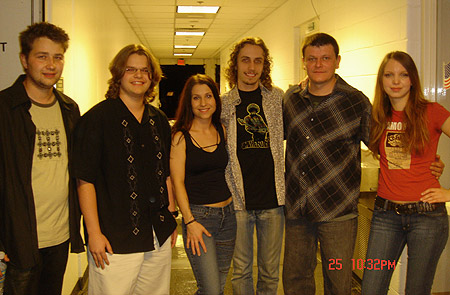
Ivan Chopik with Bering Strait in 2005
SO: I think the main thing that I’ve learned was that, (and its gonna sound really cheesy, but I know it works) if you really want something, just go for it and do it regardless of what the obstacles are. As long as you’re sure that that’s what you want to do and you really in love with your music or your project, you should be pushing and pushing and pushing. The winner is the one who pushes the most and doesn’t give up. And as cheesy and pep-talkish as it sounds, that’s the truth.
IC: Is there any advice you can give to aspiring musicians here at Berklee?
SO: My advice would be to take the education that you receive at Berklee, which is one of the top schools in the world for music, and combine it with what you hear around you. School is good for knowledge, but it doesn’t necessarily mean that all the rules will apply in the real world, in real situations. To me, I think it’s got to be a combination of what you learn at school and adapting it to the current situation in the music industry or in the genre.



